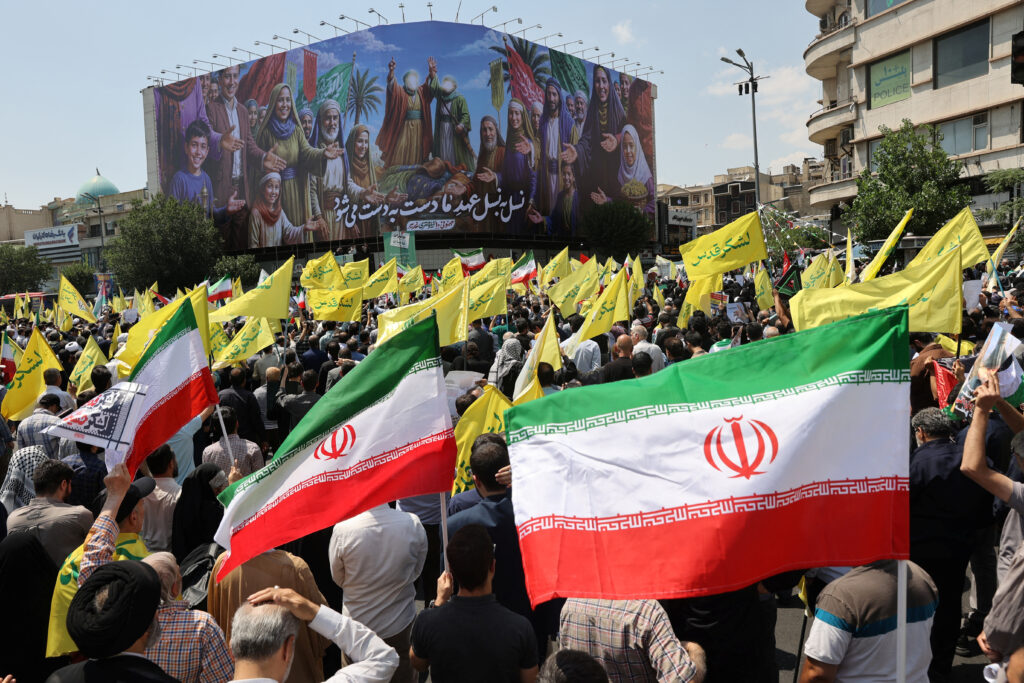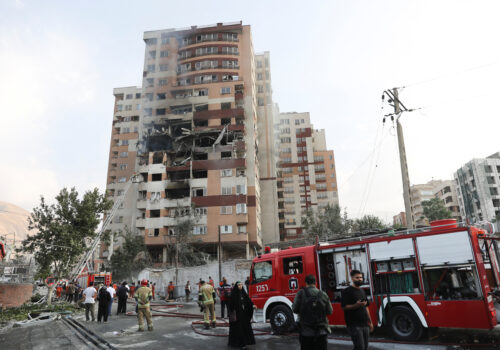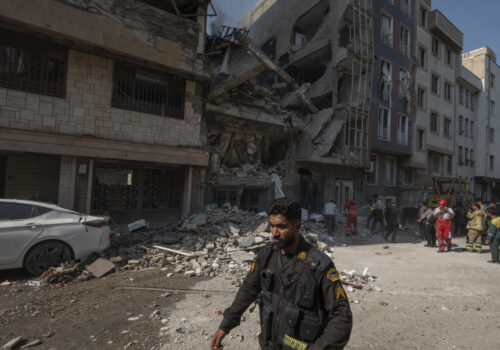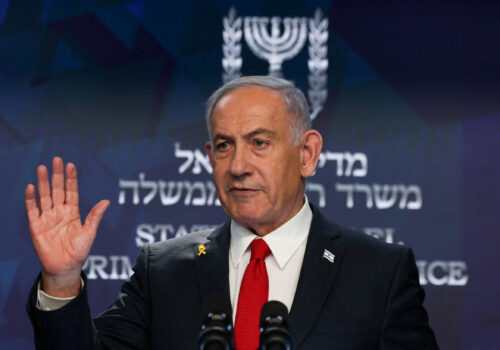The questions after Israel’s sweeping strikes against Iran’s military and nuclear sites outnumber the answers. In particular, there are four key questions whose answers will help determine the trajectory of the Middle East and perhaps beyond—not only over the coming weeks, but potentially for the coming years:
1. What is the scale of Israeli military operations in Iran?
Israel’s focus now is on Iran’s nuclear facilities, as well as undermining Iran’s command and control and military leadership, with the goal of trying to mitigate the intensity of Israel’s response (which started last night with Tehran launching one hundred drones). The Israelis are going to continue strikes for at least the coming days. The expectation is that they will go after key Iranian nuclear infrastructure to delay Iran’s timeline to a nuclear bomb, even if Israel on its own cannot fully eliminate Iran’s pathway to one.
But is the scale of the attacks to come so large and diverse that Israel’s end goal is not only crippling Iran’s nuclear program but fomenting regime change? The targets Israel chooses will help determine the answer to that question, but a warning is also warranted. For years, many in Israel have insisted that regime change in Iran would prompt a new and better day—that nothing could be worse than the current theocratic regime. Iran is indeed led by a terrible autocracy that has undermined the growth of the country and tremendously hurt its own people. But history tells us it can always be worse. What is likely to follow a theocratic Iranian government is not democracy but Islamic Revolutionary Guard Corps–istan. Such a government is likely, at least initially, to be much more hardline than the current one. In such a case, Israel might find itself in a perpetual, ongoing, and far more intense war that is no longer in the shadows, as it has been for years.
2. What shape does Iran’s response take?
The United States, in a statement issued by Rubio, went out of its way to disclaim any responsibility related to Israel’s attack. Iran’s defense minister threatened US interests in the region just a couple days ago. The potential for these strikes helped prompt the evacuations of US personnel earlier this week.
Hardliners in Iran, however, continue to see little daylight between Washington and Jerusalem. And Iranian officials overnight said they “held the US responsible.” Yet striking US interests would probably result in the United States joining Israel in offensive military strikes against Iran. It’s possible that US defensive support to Israel, which is almost certain to be provided to help mitigate Iranian retaliation, could be enough to be interpreted by Tehran as the United States getting involved.
But imagine that Iran doesn’t attack US interests or those of Gulf allies, stays solely focused on Israel (with the help of proxies such as Iraqi Shia militias, the Houthis, and eventually maybe Hezbollah, though the group is signaling it will not get involved), and unleashes asymmetric attacks against Israeli and Jewish sites across the globe. In such a scenario, the Trump administration will likely come under pressure to help Israel destroy some sites associated with Iran’s nuclear program, such as the heavily fortified Fordow Fuel Enrichment Plant. Some national security traditionalists in the United States will view this as a once-in-a-generation opportunity, while those with more isolationist tendencies in the Trump administration and on the left will argue for the opposite approach.
3. How does Iran approach its nuclear program over the long term?
US President Donald Trump used social media on Friday morning to try to prompt Iran to reflect on the overnight strikes and cut a deal “before there is nothing left.” But these developments, including the killing of multiple senior Iranian officials, are more likely to prompt Iran to try to rush for a bomb. One of the more overlooked data points on Thursday was that the International Atomic Energy Agency (IAEA) voted for the first time in twenty years that Iran was not in compliance with its nuclear nonproliferation obligations. Israel may have assessed that Iran was “racing” toward a bomb and viewed the IAEA decision as the diplomatic side of the same coin as its own military strikes. Iran, however, may determine that the Israeli strikes mean time is up for the regime to decide whether to obtain a bomb, if it hasn’t made that decision already. The conclusion could be that it can no longer sit on the proverbial nuclear fence, and that it has to rush for a bomb or risk never having one.
This may seem counterintuitive at a time when Israeli strikes are raining down on Iran because of its nuclear program. But just as Israel views Iran with a nuclear weapon as an existential threat, for many Iranian leaders an Iran without a nuclear weapon (or the potential to have one) is an existential threat to the survival of the regime itself. Many Iranian leaders believe that a nuclear weapon ultimately provides them stability and protection, just as it has for North Korea in their view.
4. What exactly did the US know about the impending strikes?
This is a question for the long term. But depending on the answer, it might be the one that prompts a fundamental change in the US-Israel relationship. For weeks, Trump warned Israeli Prime Minister Benjamin Netanyahu not to strike Iran. Only in the last few days did the president acknowledge that negotiations with Iran were not on a positive track and that an Israeli strike “could very well happen.” Israeli sources are claiming this morning that there was more coordination with and support from Trump than is publicly known, and that the Trump administration was part of the ruse and disinformation campaign before the strikes; US officials haven’t yet backed up that claim.
If the US president knew about the strikes and conveyed that he wouldn’t support them but also wouldn’t stop Israel from carrying them out, then his decision to acquiesce to Jerusalem’s decision to strike is unlikely to alter the long-term relationship between the two countries. But if the Israelis warned Trump that they were going to strike (hence the evacuation of Americans), the US president told the Israelis not to, and the Israelis went ahead with the plan anyway, then we may look back at Thursday as the evening in which the US-Israel relationship permanently shifted. Trump has long had a poor relationship with Netanyahu, which was on display in recent months through the US president’s decisions to impose tariffs on Israel, cut a separate deal with the Houthis in Yemen, take an approach to Syria that Israel opposed, and, of course, negotiate with Iran. A shift in the traditional US-Israel relationship might be a tectonic change for many in Washington, DC. But for Trump, it might just be yet another transactional decision.
Jonathan Panikoff is the director of the Atlantic Council’s Scowcroft Middle East Security Initiative and a former deputy national intelligence officer for the Near East at the US National Intelligence Council.
Further reading
Thu, Jun 12, 2025
Experts react: Israel just attacked Iran’s military and nuclear sites. What’s next?
New Atlanticist By
Our experts shed light on Israel’s major attack against Iran targeting its nuclear facilities and its implications for the region.
Fri, Jun 13, 2025
Unknowns, knowns, and early predictions about Israel’s strikes against Iran
New Atlanticist By William F. Wechsler
How long Israel’s campaign against Iran will go on is unknown. But even amid the uncertainty, don’t lose sight of what is already known—or at least what can already be surmised with high confidence.
Thu, May 29, 2025
Five questions (and expert answers) on the state of the Netanyahu government
New Atlanticist By
The Israeli prime minister is facing increasing pressure from within his country and in his government coalition as well as from abroad.
Image: People attend an anti-Israeli protest following the Israeli strikes on Iran, in Tehran, Iran, June 13, 2025. Majid Asgaripour/WANA (West Asia News Agency) via REUTERS




